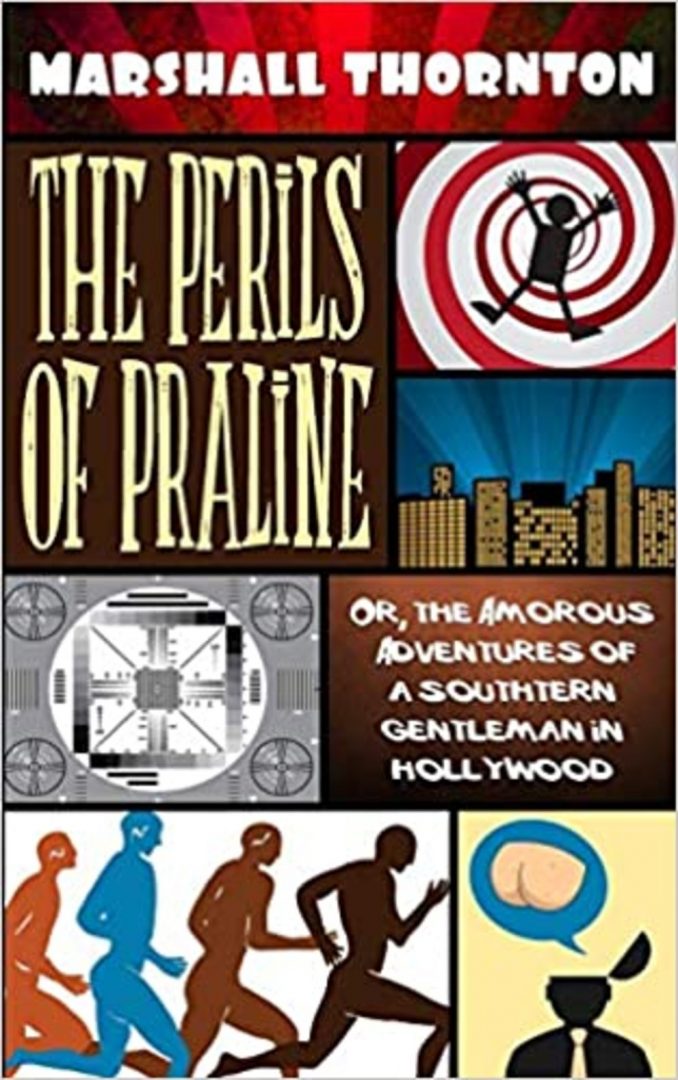Writing Satire in the Age of Trump

Author: Marshall Thornton
January 17, 2017
Back in 2010, I published The Perils of Praline, or the Amorous Adventures of a Southern Gentleman in Hollywood, which was basically the silliest, sexiest book I could think up. It also included a hefty dose of satire, both political and cultural. Over the years fans have asked if I was going to write a sequel. For a long time, I answered maybe. I had originally planned to write two more of the books, the second set in Las Vegas for which I had notes, and the third to be set in Washington. Other projects kept taking precedence and eventually I began answering the question of a sequel with no. Then last summer, I was asked the question again and I said, “No” but then reflected and added, “Unless, of course, Trump wins. Then I may have to.” Of course, I thought this was incredibly unlikely and forgot all about it.
Then, the election happened. Like a lot of the country I was truly shocked and in the subsequent weeks depressed. In fact, I had trouble writing anything since I was so focused on the disaster that had just happened. Until, I remembered that conversation and thought, “Why not? Why not write another Praline book?” and so I began working on Praline Goes to Washington, or the Erotic Misdeeds of a Newly Native Californian in our Nation’s Capitol.
Satire is the art of making comedy by heightening reality to the level of absurdity, in the process exposing the hypocrisy and imagined intentions of individuals or types of individuals. That’s my definition. Miriam Webster’s definition is simpler and, at the same time, less clear: “A literary work holding up human vices and follies to ridicule or scorn.” What I found interesting about writing a satire contemporaneously to the events I was satirizing is that, in this case, Trump and his new administration could either match or exceed the over-the-top heightened reality I was creating. A couple of times, after I’d written something I thought completely absurd, it would appear on the news.
In the new book, instead of getting into the whole Russia thing I brought back the tiny (and fictional) principality of Malvania. Helmut Dump’s wife, Melanoma, is Malvanian and so Malvania spreads a lot of fake news to help his campaign. When I wrote that, I knew that Russia has likely involved in the hacking of the DNC and the subsequent distribution to Wikileaks. That they were also involved in spreading fake news stories did not come to light (or at least to my attention) until well after I had had Malvania do exactly that.
Another weird and incredibly disturbing coincidence is that in my book, Helmut Dump is quoted as saying, “Don’t listen to what I say, listen to what I mean.” Later, Dump’s assistant Keely Angst in an interview says, “You shouldn’t listen to what Mr. Dump says. You should listen to what I say he says. And I’m telling you the president-elect did not say any of the things you heard him say.” Both of these moments are eerily similar to something Kellyanne Conway said when she accused the media, “You always want to go by what’s come out of his mouth rather than look at what’s in his heart.”
Some of my friends have worried that I might face legal action over the book. Satire is protected speech under the first amendment. No president in our history has gone un-satirized. It comes with the territory. There is a libel case that the Trumps are pursuing, but it’s in England where the libel laws are looser (and more to Trump’s liking) and the case is about the reporting of events that may or may not have happened as true. Satire is not journalism. None of what I’ve written is true or presented as true. I don’t have any information that we’re not all reading in the news every day.
And speaking of the news, oh my God. Every day it becomes more and more bizarre. I have to say it’s a challenge to write satire when those you’re satirizing keep becoming increasingly over the top themselves. Suddenly, the most absurd things I could think of are part of the news cycle. And every day it becomes more and more apparent that the people leading our country are more dangerous than any caricature I, or anyone else, could write. I wish that none of this was true. I wish they we still lived in a time when Chevy Chase’s big joke about Gerald Ford was that he was clumsy, or when we joked about Jimmy Carter’s Southern accent and what he might be lusting about in his heart. Gradually, we’ve moved into a time when we have to joke about politicians who are mean, corrupt, ill-prepared, traitorous, and dangerously erratic. That can be a hard thing to make jokes about. But I think we have to. No matter how bad things get, laughter will lighten our load.
And finally, I know that some people might say that satire doesn’t serve a purpose, that it’s nothing more than preaching to the choir. It’s true that I don’t expect a lot of people who voted for Donald Trump to pick up my book and miraculously change their minds. But the thing is, I think the choir does need to be preached to, at least occasionally, if only to remember why they’re singing.

